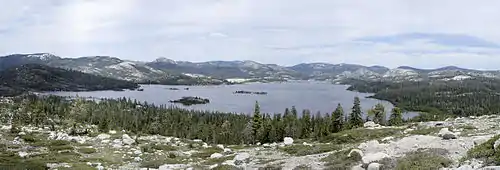Upper American River Project
The Upper American River Project (UARP) is a hydroelectric system operated by the Sacramento Municipal Utility District (SMUD) of Sacramento, California in the United States.

The system consists of 11 dams and eight powerhouses that tap the upper tributaries of the American River drainage in the Sierra Nevada for power generation. Total installed capacity is over 687 MW, producing 1.8 billion KWh annually, enough for 20 percent of the city's electricity needs.[1]
The project mainly utilizes water from the South Fork American River and its tributaries, although some water is drawn from the Rubicon River, a tributary of the Middle Fork American River. Project dams provide water storage of about 430,000 acre⋅ft (530,000 dam3) and a total hydraulic head of 5,417 ft (1,651 m) from the highest reservoir to the lowest powerplant outflow.[2]
History
The UARP was authorized on August 28, 1957 by an act of the Federal Power Commission. SMUD began construction in September of that year, and the first power generation from UARP came online at Jaybird Powerhouse on May 1, 1961.[3] Most of the project facilities were completed by 1967. The Loon Lake Powerhouse was completed in 1971, and Jones Fork Powerhouse was finished in 1985.[3]
Environmental impacts include the prevention of fish passage by the project's dams, which segment parts of the upper South Fork American River, the Rubicon River and their tributaries.
Overview
Water is diverted from the Rubicon River to a storage reservoir, Loon Lake, from which it is released through the Loon Lake Powerhouse to Gerle Creek. This water is intercepted and diverted into Silver Creek, a tributary of the South Fork American River, flowing through the Robbs Peak Powerhouse into Union Valley Reservoir, the project's principal reservoir. Water from Ice House Reservoir also enters Union Valley via the Jones Fork Powerhouse.[2]
From Union Valley, water flows through the Union Valley Powerhouse to Junction Reservoir, then through Jaybird Powerhouse to Camino Reservoir, both on Silver Creek. The water then enters a penstock that feeds the Camino Powerhouse above Slab Creek Reservoir on the South Fork American River. From there, water is sent through a final tunnel to White Rock Powerhouse, located on the upper end of Chili Bar Reservoir also on the South Fork.[2][4]
List of facilities
| Dam | Stream | Capacity | |
|---|---|---|---|
| acre.ft | dam3 | ||
| Brush Creek | Brush Creek | 1,530 | 1,890 |
| Buck Island† | Unnamed | 1,070 | 1,320 |
| Camino | Silver Creek | 825 | 1,018 |
| Gerle Creek | Gerle Creek | 5,231 | 6,452 |
| Ice House | South Fork Silver Creek | 45,960 | 56,690 |
| Junction | Silver Creek | 3,250 | 4,010 |
| Slab Creek | South Fork American River | 16,600 | 20,500 |
| Loon Lake | Gerle Creek | 76,200 | 94,000 |
| Robbs Peak† | South Fork Rubicon River | 30 | 37 |
| Rubicon | Rubicon River | 1,450 | 1,790 |
| Union Valley | Silver Creek | 277,290 | 342,030 |
| Total | 429,436 | 529,702 | |
† indicates a diversion dam
| Name | Capacity (MW) | Hydraulic head | Annual generation (KWh, 2002–2012) | |
|---|---|---|---|---|
| ft | m | |||
| Camino | 150.0 | 1,065 | 325 | 356,187,000 |
| Jaybird | 144.0 | 1,535 | 468 | 532,315,000 |
| Jones Fork | 11.5 | 580 | 180 | 20,677,000 |
| Loon Lake | 82.0 | 1,179 | 359 | 97,891,000 |
| Robbs Peak | 29.0 | 361 | 110 | 48,897,000 |
| Slab Creek | 0.4 | 250 | 76 | 1,612,000 |
| Union Valley | 46.7 | 420 | 130 | 123,393,000 |
| White Rock | 224.0 | 867 | 264 | 529,824,000 |
| Total | 687.6 | 1.710794×109 | ||
References
- "Project Overview". Sacramento Municipal Utility District. Retrieved 2013-04-15.
- "SACRAMENTO MUNICIPAL UTILITY DISTRICT: Upper American River Project, Federal Energy Regulatory Commission Project No. 2101" (PDF). Sacramento Municipal Utility District. 2001. Retrieved 2013-04-15.
- "The History of SMUD's UARP" (PDF). Sacramento Municipal Utility District. 2001. Retrieved 2013-04-15.
- "The Project Maps". Sacramento Municipal Utility District. Retrieved 2013-04-15.
- USGS Topo Maps for United States (Map). Cartography by United States Geological Survey. ACME Mapper. Retrieved 2013-04-15.
- "California Hydroelectric Statistics & Data". California Energy Commission. Archived from the original on 2018-02-26. Retrieved 2018-04-27.